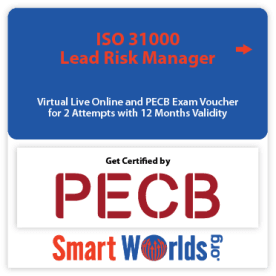PECB ISO 22000 Lead Auditor Live Online in English
- Includes PECB certification and exam fee (Exam voucher validity 12 months)
- A participation certificate of 31 CPD (Continuing Professional Development) credits will be issued by PECB
- In case of exam failure, you can retake the exam within 12 months, from date of enrollment for free
- Live Online is training session with Live PECB Approved Trainer via Zoom/Teams, online lifelong access to course slides through MyPECB platform
$ 2,499 USD $ 5,998 USD
Why should you attend?
The ever-increasing popularity of food safety, as one of the key aspects of the food industry, has boosted demands from organizations to get certified against ISO 22000. Such certification demonstrates commitment from organizations toward the wellbeing of their consumers and provides sustainability in the market. A PECB auditor credential is a formal and independent recognition of your personal competences. It proves that you are qualified to conduct food safety management system (FSMS) audits for a certification body.
This training course has been developed to reflect the importance of an effective audit. It strengthens your knowledge and skills to plan and carry out an FSMS audit in compliance with the guidelines for auditing management systems provided in ISO 19011 and the certification process presented in ISO/IEC 17021-1.
Through practical exercises, interactive sessions, and discussions, you will be able to gain knowledge on the FSMS and audit techniques. You will also be able to perform an FSMS audit by applying widely recognized audit principles, procedures, and techniques, as well as be able to manage an audit team.
After attending the training course, you can take the exam. If you pass, you can apply for the “PECB Certified ISO 22000 Lead Auditor” credential. An internationally recognized “PECB ISO 22000 Lead Auditor” certificate validates your professional capabilities and competences to audit organizations based on the requirements of ISO 22000 and auditing best practices.
Who should attend?
- Auditors interested in performing and leading food safety management system audits
- Managers or consultants interested in mastering the food safety management system audit process
- Individuals responsible for maintaining conformity to the FSMS requirements in an organization
- Technical experts interested in preparing for a food safety management system audit
- Expert advisors in food safety management
Learning objectives
This training course enables you to understand the:
- Operations of a food safety management system based on ISO 22000
- Relationship between ISO 22000 and other standards and regulatory frameworks
- Requirements of ISO 22000 in the context of an FSMS audit
- Auditor’s role in planning, leading, and following up on a management system audit in accordance with ISO 19011
Educational approach
This training course is participant centered and contains:
- Theories, auditing best practices used in FSMS audits, ISO 22000 requirements, and international auditing standards
- Lecture sessions, which are illustrated with practical exercises based on a case study that includes role-playing and discussions
- Interactions, made between participants by means of questions and suggestions
- Exercises, which are a simulation and preview of the certification exam
Prerequisites
The main requirements for participating in this training course are: a fundamental understanding of food safety concepts and a comprehensive knowledge of FSMS audit principles.
Course agenda
Day 1: Introduction to the food safety management system (FSMS) and ISO 22000
Day 2: Audit principles and the preparation for and initiation of an audit
Day 3: On-site audit activities
Day 4: Closing of the audit
Day 5: Certification exam
Related products
-
ISO 27001, 4 days live online
PECB ISO/IEC 27001 Lead Auditor – Live Online – English – 2 PECB Exam Attempts Included – Training Materials and Exam Based on Latest ISO/IEC 27001:2022 Standard
 ISO 27001, 4 days live online
ISO 27001, 4 days live onlinePECB ISO/IEC 27001 Lead Auditor – Live Online – English – 2 PECB Exam Attempts Included – Training Materials and Exam Based on Latest ISO/IEC 27001:2022 Standard
0 out of 5(0)- Includes PECB certification and exam fee (Exam voucher validity 12 months)
- A participation certificate of 31 CPD (Continuing Professional Development) credits will be issued by PECB
- In case of exam failure, you can retake the exam within 12 months, from date of enrollment for free
- Live Online is training session with Live PECB Approved Trainer via Zoom/Teams, online lifelong access to course slides through MyPECB platform
SKU: n/a -
4 days live online, Cybersecurity
PECB Cyber Threat Analyst – Live Online – English – 2 Exam Attempts Included
 4 days live online, Cybersecurity
4 days live online, CybersecurityPECB Cyber Threat Analyst – Live Online – English – 2 Exam Attempts Included
0 out of 5(0)- Includes PECB certification and exam fee (Exam voucher validity 12 months)
- A participation certificate of 31 CPD (Continuing Professional Development) credits will be issued by PECB
- In case of exam failure, you can retake the exam within 12 months, from date of enrollment for free
- Live Online is training session with Live PECB Approved Trainer via Zoom/Teams, plus you get Online lifelong access to course slides through MyPECB platform, plus 2 exam attempts voucher, for online web-proctored PECB exam
SKU: n/a -
Live Online, 27033, 4 days live online
PECB ISO/IEC 27033 Lead Network Security Manager – Live online – English – 2 PECB Exam Attempts Included
 Live Online, 27033, 4 days live online
Live Online, 27033, 4 days live onlinePECB ISO/IEC 27033 Lead Network Security Manager – Live online – English – 2 PECB Exam Attempts Included
0 out of 5(0)- Includes PECB certification and exam fee (Exam voucher validity 12 months)
- A participation certificate of 31 CPD (Continuing Professional Development) credits will be issued by PECB
- In case of exam failure, you can retake the exam within 12 months, from date of enrollment for free
- Live Online is training session with Live PECB Approved Trainer via Zoom/Teams, plus you get Online lifelong access to course slides through MyPECB platform, plus 2 exam attempts voucher, for online web-proctored PECB exam
SKU: n/a -
ISO 31000, 4 days live online, Live Online
PECB ISO 31000 Lead Risk Manager – Live online – English – 2 PECB Exam Attempts Included
 ISO 31000, 4 days live online, Live Online
ISO 31000, 4 days live online, Live OnlinePECB ISO 31000 Lead Risk Manager – Live online – English – 2 PECB Exam Attempts Included
0 out of 5(0)- Includes PECB certification and exam fee (Exam voucher validity 12 months)
- A participation certificate of 31 CPD (Continuing Professional Development) credits will be issued by PECB
- In case of exam failure, you can retake the exam within 12 months, from date of enrollment for free
- Live Online is training session with Live PECB Approved Trainer via Zoom/Teams, Online lifelong access to course slides through MyPECB platform
SKU: n/a

